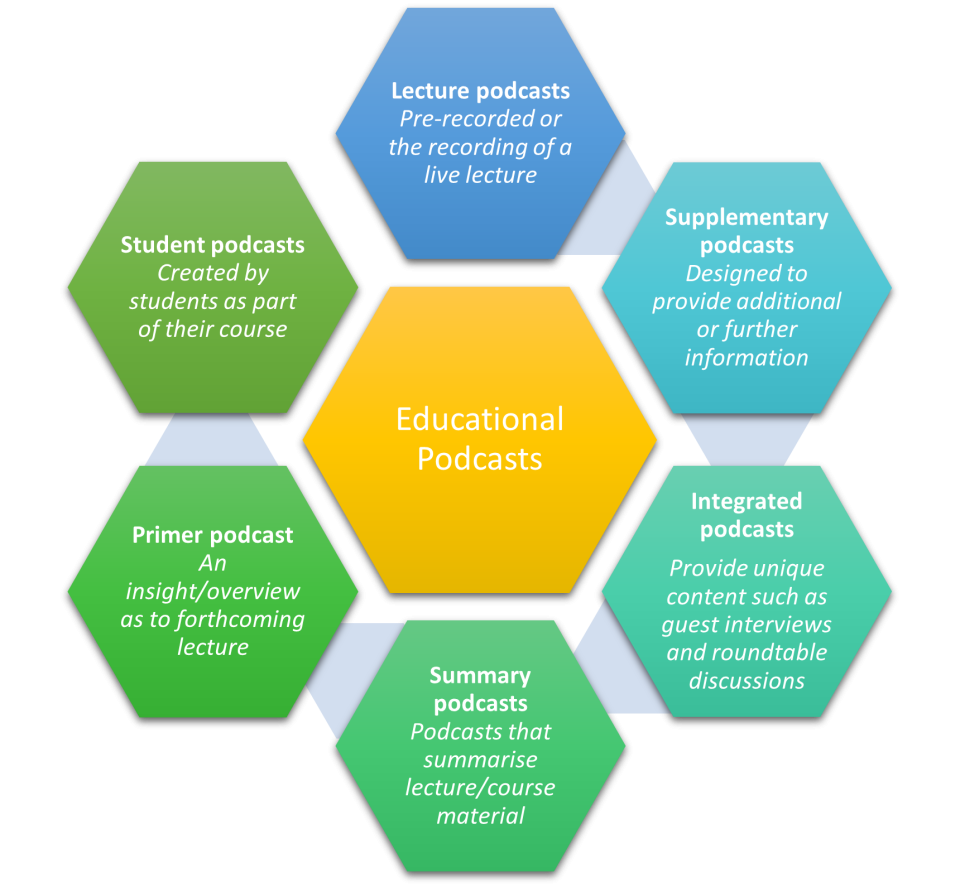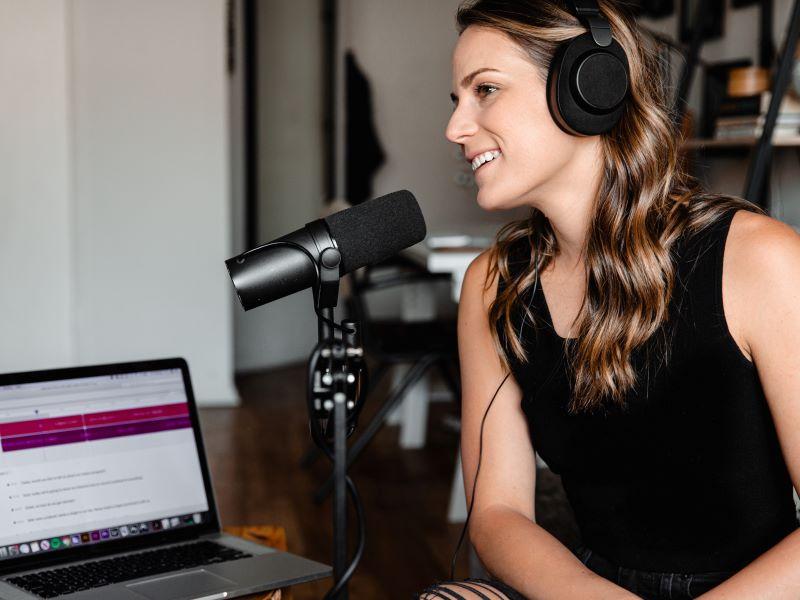Many challenges associated with ensuring student engagement and minimising attrition when teaching online are well established in the context of postgraduate education, where remote study has long been a key component. Educational podcasts have been used successfully to address these challenges and improve postgrad student online learning experiences.
Now that many universities plan to continue hybrid and online teaching for their undergraduates, lessons can be learned from what has worked for postgrads, including examining why and how to effectively use podcasts for teaching.
Benefits of podcasts
-
Podcasts can be downloaded on to a device and listened to offline, giving students who are travelling or studying remotely an easily available and accessible learning resource.
-
Podcasts can bridge disparities in technological access, such as settings where internet connection cannot be relied upon and students struggle with lengthy video lectures or live-streamed interactive content. Such struggles are likely to heighten the sense of disengagement and isolation.
-
Podcasts can assist students whose first language is not English, providing an opportunity to engage with audio learning materials specific to their subject area that can be supported by subtitles or a script.
-
Podcasts can reduce feelings of isolation and enable students to feel connected to their university community and wider field of study, as the academic or technical detail shared in podcasts can enhance their understanding of an area and perception of a course.
-
Listening to the teacher’s voice in a less formal tone can improve rapport between student and teacher and draw on those lecture moments that are hard to capture in an online environment: the end of lecture final thoughts and guidance, and perhaps even incorporating humour and banter into the student’s university experience.
Ensuring students feel engaged and integrated into their university community is a key factor in minimising attrition rates, a long-standing problem among online students when compared to those on campus.
The benefits of podcasting extend to the lecturers. They are cheap to produce, they can be time efficient and are an effective vehicle for discussion around relevant topics. While podcasting platforms can be used, they can also be uploaded directly as MP3 files to learning management systems such as Learn or Moodle. Most importantly, they are enjoyable to produce and a welcome change from usual practice, especially when they incorporate contributions from colleagues and visitors.
Types of educational podcast
Educational podcasts can be categorised according to content and participants:
Lecture podcasts are recordings of live lectures or pre-recorded lectures. It can be challenging converting a live lecture into a podcast as the audio quality may be poor and it’s likely to include references to or complete narration of slides. Recording a single monologue produced especially as a podcast lecture is likely to be better.
Supplementary podcasts are designed to enhance existing lectures and learning materials and provide additional or further exploration of an area. These can be produced by course tutors or students can be directed to other relevant podcasts available online.
Integrated podcasts are especially useful as supplementary material, taking the format of two or more people in discussion. This could be a roundtable discussion and include invited guests who are experts in their fields. Explore the plethora of podcasts available online from university departments and pan-institutional collaborations that use this format to showcase their research, you may find content is likely to be relevant to your course. Integrated podcasts can be produced in-house by inviting colleagues, collaborators and visitors to your institution and recording discussions. Most academics enjoy talking about their areas of research and with a little planning, recordings of these fruitful conversations can offer students new or alternate insights into the academic discussions around their disciplines. This informative yet informal style of discussion that incorporates the personalities of the participants, is especially popular with students.
Summary podcasts can also be used to capture the key points from a lecture or particular area of study.
Primer podcasts can be used to prepare students for forthcoming topics and assessments or to give feedback. While a summary podcast might “round up” the week, a primer podcast will introduce a new area of study.
Student podcasts can be used as assignments or assessments. Group work is notoriously tricky to incorporate in online learning so directing students to research and produce a podcast as a group assignment is one solution.

Producing podcasts – where to start?
The set up for producing podcasts ranges from very basic to professional levels of production with the cost and time investment increasing in parallel.
There are many online resources offering direction on starting a podcast, but the first thing to consider is a decent microphone. Good sound quality is vital and microphones range in price and specification to suit all budgets. A good laptop microphone may be fine for a sole commentator.
Free online software such as Audacity is an ideal starting point for recording and editing content. It enables you to stitch recordings together, improve sound quality and add music that can fade in and out to give further production value. Make sure you source your music copyright-free.
The final file can be saved as an MP3 to be uploaded to the LMS where the students can stream or download for listening offline.
As with any new skill, it will take a bit of time to familiarise oneself with recording technology and editing software but with rewarding results.
The production of integrated podcasts, which are popular with students, especially when their teacher leads the discussion, provides an opportunity to draw colleagues together, each taking questions on their fields of expertise or discussing a recent paper.
Schedule the time and a quiet room to spend 20 minutes asking a visiting lecturer about their latest work. Tap into your connections and former collaborations, ask for podcast opportunities to reciprocate for your time and engagement when it’s asked for elsewhere. Research students past and present are usually keen to get involved and discuss their work.
A new way of learning
Postgraduate student feedback on podcasts has been overwhelmingly positive, repeatedly citing them as a standout feature. These findings have been repeated across academic fields of study.
Podcasts offer a new and different way of learning for undergraduate online modules at a time when increased heterogeneity in resources and pedagogical tools is needed to enrich the learning experience.
Emily O’Reilly is a teaching fellow at the University of Edinburgh.
If you found this interesting and want advice and insight from academics and university staff delivered direct to your inbox each week, sign up for the THE Campus newsletter.




comment